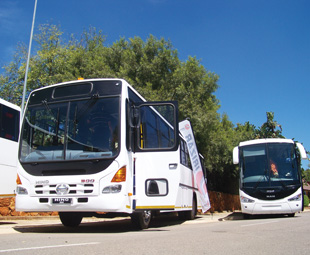Banding together to build a better bus industry

Operators, manufacturers, consumers and government came together to discuss various issues pertaining to the bus industry. DANIELLE DU TOIT continues her report back of the annual SABOA conference.
Operators have to ensure they are protected from the various risks that arise from owning a business. Dr Elmarie Smith, national sales manager at MAN Financial Services, says risk management involves assessing and quantifying risks, then taking measures to control or reduce them. These risks can include anything from property damage to financial losses to human error – and it’s best to be prepared.
A risk many bus operators face is cancellation of contracts. This will place serious financial strain on the company and its employees. Smith advises being well appraised of your contractual rights with regards to re-tendering and the renewal of contracts – and to always structure finance agreements over a period similar or shorter than the duration of the contract to avoid a mismatch.
Insurance is one of the best forms of asset management one can have and increases operators’ awareness of the roadworthiness of their vehicles. Financial, legal liability and asset insurance are critical to the survival of any business in the event of an accident, market fluctuation or legal incident. Workmen’s Compensation is also an important form of insurance.
 The small bus operators (SBOs) of South Africa have, for too long, been asking government to implement a formal empowerment plan. They feel too many contracts are being awarded to the larger companies while they are struggling to survive. The Department of Transport is trying to make this happen on a provincial scale, but without much luck.
The small bus operators (SBOs) of South Africa have, for too long, been asking government to implement a formal empowerment plan. They feel too many contracts are being awarded to the larger companies while they are struggling to survive. The Department of Transport is trying to make this happen on a provincial scale, but without much luck.
As Mathabatha Mokonyama, deputy director general for public transport in the Department of Transport, said: “It is desirable that as many SBOs as possible in all nine provinces form part of this initiative.”
He added that there were unequal opportunities in the industry due to outdated, unjust polices which often afforded better opportunities to certain groups. Difficulties in getting financial capital have resulted in many of the subsidised companies being left in the control of the state or large corporations. As is the case with many industries, markets tend to favour the better known, more reputable companies.
Mokonyama said the point of a formalisation process is to establish structures for SBOs and to that ensure these companies are brought into the economic mainstream. This is where companies benefit with regards to the consumer protection act (CPA), which is trying to create an equal marketplace for service providers.
Formalisation would also mean that regulations would be put in place – such as licence requirements and roadworthiness – and this would contribute to a safer public transport system.
Contracting and labour law
Labour issues discussed at the conference focused predominantly on contracting in regards to the Labour Relations Act (LRA), which says a “service” includes even internal services of a business unrelated to the service provided by the business to outsiders (for example, non-core departments such as cleaning and gardening). Outsourcing of services (be they internal or external) to contractors normally constitutes the takeover of a going concern for the purposes of Section 197 of the LRA.
Yes, this confused everyone – essentially Section 197 of the Labour Relations Act comes into effect when outsourcing occurs and forces the new operator of the service to take over all the labour obligations of the old undertaking.
It is vital for employers to know which transfers do and do not fall under this legislation because they need to know whether the new employer will be forced to take over all the old employer’s employees and whether the new employer will have to recognise and preserve all the benefits, remuneration, working conditions, years of service and other rights of the employees.
Robin Carr, partner at Bowman Gilfillan attorneys said: “All the rights and obligations between the old employer and its employees become the rights and obligations of the new employer, and anything done by the old employer in relation to its employees is deemed in effect to be done by the new employer.” This ensures continuity of service. The intention of Section 197 is to protect jobs and the services of employees should a transfer of ownership take place.
The whole labour issue becomes contentious when there is outsourcing. Mike Jesseman, CEO of Trans-Africa Holdings, maintains that the devil is in the details and pointed out that the statutes are unclear. He showed that 24 percent of South Africa’s labour force was represented in the transport industry – yet few have an employment record spanning more than 10 years. Makes one wonder if the labour force really is protected?
Legalities
Alta Swanepoel of Alta Swanepoel and Associates gave updates on changes in the Road Traffic Regulations and AARTO developments. Roadworthy certificates for buses are now only valid for six months – it used to be a year. The height restriction of ISO (intermodal) containers was removed. Johannesburg Metropolitan Police Department officers must wear their name badges when in uniform or they are not considered on duty.
There were about 50 or so changes made to the regulations but perhaps the most interesting one pertains to “blue-light” vehicles. There is nothing in the regulations that says you can or cannot have your own blue light. But you didn’t read that here.
The SABOA conference is a vital gathering – all industry people suffer the same problems with regards to the governments, people and the law. Working together as a unit instead of against one another is the only way to approach and solve problems – and it’s the way to better BUSiness.
Published by
Focus on Transport
focusmagsa




